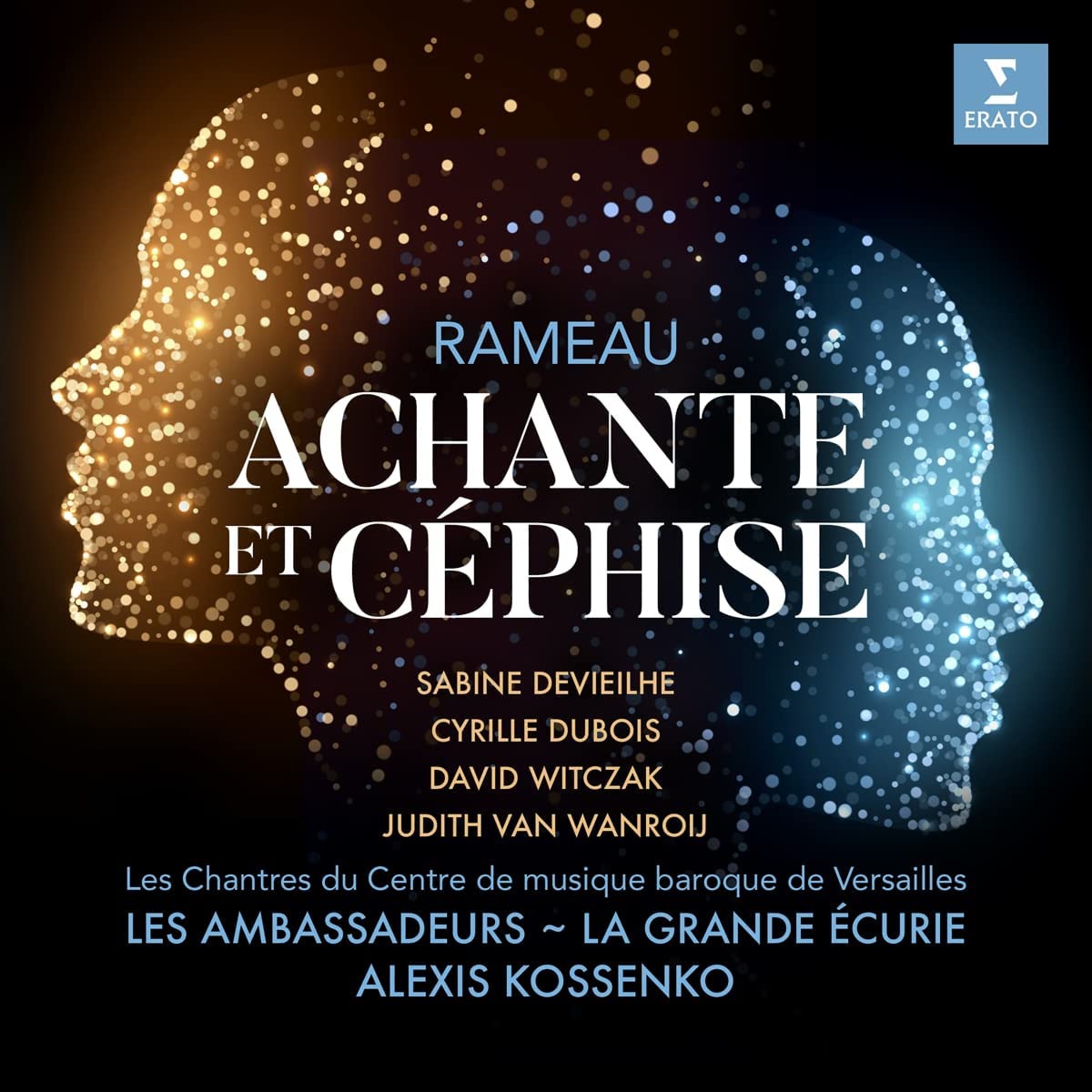Sabine Devieilhe Céphie, Cyrelle Dubois Achante, David Witczak Le Génie Oroès, Judith can Wandroij Zirphile, Les Chantres du Centre de musique baroque de Versailles, Les Ambassadeurs, La Grande Écurie, Alexis Kossenko
130:25 (2 CDs in a card box)
Erato 1 90296 69394 6
Click HERE to buy this album on amazon
[Doing so supports the artists, the record company and keeps this site available – if no-one buys, no money is made and the site will disappear…]
Even fervent Ramellians can be forgiven for not having previously encountered Achante et Cephise, a pastorale héroïque composed and performed at the Paris Opéra in 1751 to celebrate the birth of Louis-Joseph Xavier, the son of Louis XV and named by the king as his heir apparent. For all the festivities and expectations, sadly the child would live only until the age of eight. After 14 performances the opera suffered the fate common to occasional works, being put aside with its preserved edition as was not uncommon lacking the middle parts. There it remained virtually undisturbed until the late 1990s, when a scholarly edition was published. Even then the work has had to wait a further quarter of a century for a complete performance and this recording.
One reason for this astonishing neglect may be the complexity of a work that calls for large orchestral forces including clarinets, used here with independent parts in a French opera for the first time. There is also an elaborate transformation scene that takes it from intense realms of dramatic near-tragedy to the brilliant celebratory scene with which it concludes. That in itself is unusual; such scenes are traditionally the substance of a prologue, but Achante has no prologue and – in keeping with its genre – only three acts rather than the five familiar from tragédie lyrique. To compensate it has a highly original programmatic overture which itself announces the rejoicing at the birth, with sections marked ‘Voeux de la Nation – Tocsin – Feu d’Artifice – Fanfare’. Rameau’s collaborator Jean-François Marmontel provided him with a book that also goes beyond the bounds of what might be expected in a pastorale designed to celebrate a noble birth. True, the story concerns a shepherdess and shepherd, Céphise and Achante whose happiness is thwarted by the jealousy of a spirit, Oroès. But the story develops to a thrilling dramatic climax in which hero and heroine on the orders of Oroès are abducted by north winds. That intense drama carries over from the end of act 2 straight into act 3, thus predicating the even more dramatic events which a dozen years later would engulf Alphise and Abaris as act 3 of Les Boréades spills over into act 4. The fate awaiting the lovers in Achante, in chains awaiting execution in a bleak landscape, belongs more to tragédie lyrique than pastorale. Interspersed between the drama, the dances of the divertissements are also more varied than is often the case, perhaps the most striking being a hunting scene in which the dances are accompanied almost entirely by wind and brass including the brazen braying of no fewer than four horns.
The performance owes much to the admirable Centre de musique baroque de Versailles (would that there were such an organisation in Britain) and includes much to praise. Indeed the least appealing aspect of the recording is the sound. It was made in the church of Notre-Dame-du-Libon in Paris, which here displays an over-generous reverberation period with its resultant inappropriate ecclesiastical ambiance. Give or take the odd stolidly-phrased dance, Alexis Kossenko’s direction is admirable, being especially effective in more dramatic music, and he draws some fine playing from his large band. Particularly good is some of wind playing, notably in the hunt scene mentioned above. All four of his main soloists are excellent, with Sabine Devieilhe a touchingly vulnerable Céphise and Cyrille Dubois an ardent Achante who despatches the demanding bravura aria in the final scene with commendable assurance. Baritone David Witczak projects the role of the evil Oroès to strong effect, as does Judith van Wanrou that of the good fairy Zirphile, some forced tone in the upper register notwithstanding. As is now customary given the current strength of early music in France, the numerous smaller vocal parts are without exception admirably taken. This resurrection of an unaccountably forgotten work demands to be heard by all who value French Baroque opera.
Brian Robins
